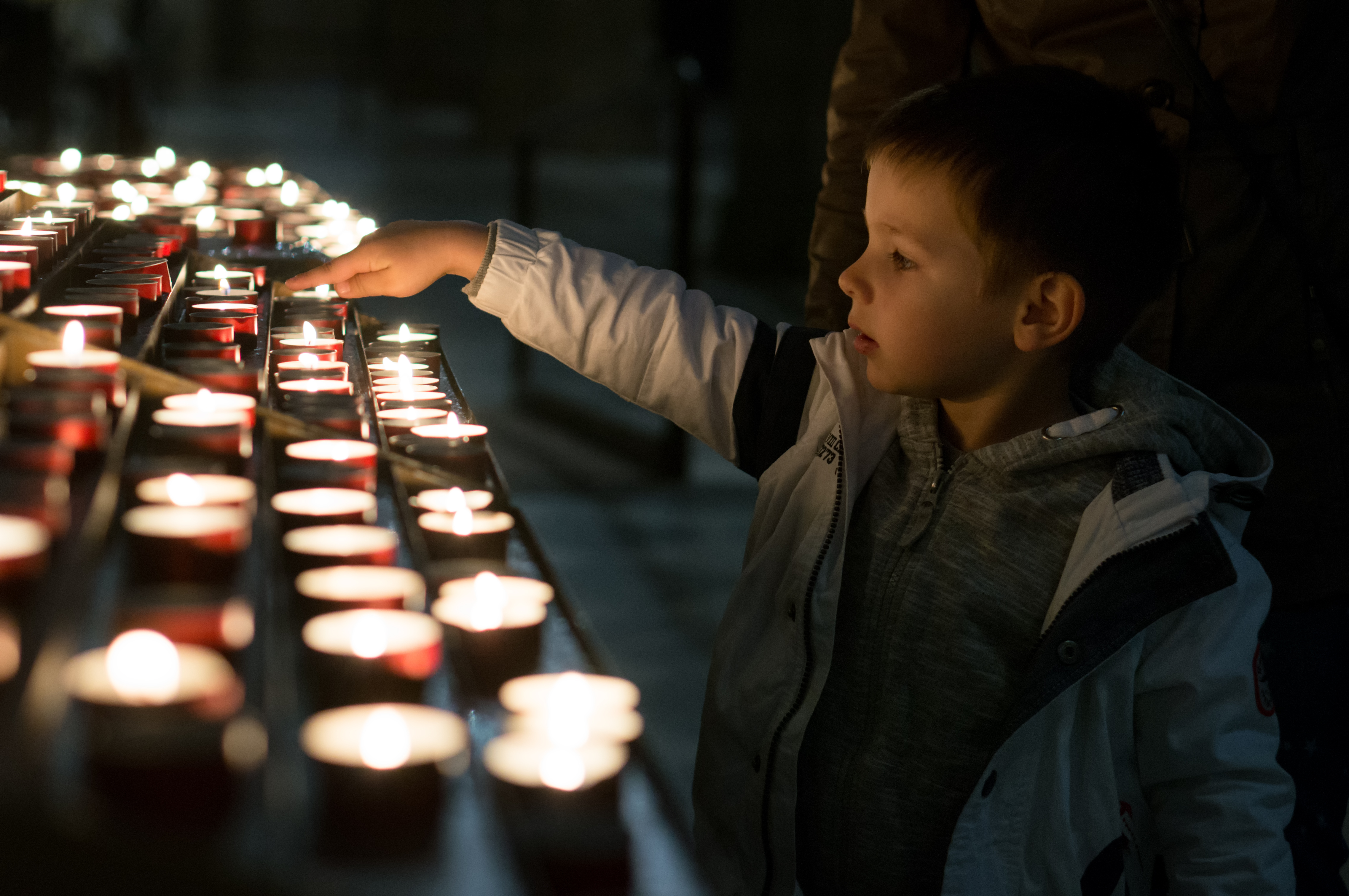Pope Francis’s Amoris Laetitia came out on April 8th—how much have you read? If you need a little push, join the AL Bootcamp with us! We will read a small bit from Chapter 4 (Love in Marriage) and ask you to do something related to it for your marriage every day. Join us on Facebook or Twitter. We’re joining one of our “sister” sites, Marriage: Unique for a Reason.
For those who prefer to print it out all at once, every day is listed below.
Sundays are your “day of rest” but that doesn’t mean you should slack off on your love
April 25
“Love is patient (1 Cor 13: 4)
Pope Francis: “The first word used is makrothyméi…Its meaning is clarified by the Greek translation of the Old Testament, where we read that God is ‘slow to anger’ (Ex 34:6; Num 14:18). It refers, then, to the quality of one who does not act on impulse and avoids giving offense… God’s ‘patience’, shown in his mercy towards sinners, is a sign of his real power” (Amoris Laetitia, no. 91).
Today, be aware of when you are tempted to be angry at your spouse, children, parents, or other relatives. Take a deep breath and remember that your first reaction is not always the most helpful or truest to the love that you have for that person. Also try to consider how your words will be taken before you say them, and whether the time is right to bring something up.
April 26
“Let all bitterness and wrath and anger and clamor and slander be put away from you, with all malice” (Eph 4:31).
Pope Francis: “We encounter problems whenever we think that relationships or people ought to be perfect, or when we put ourselves at the center and expect things to turn out our way. Then everything makes us impatient, everything makes us react aggressively. Unless we cultivate patience, we will always find excuses for responding angrily. We will end up incapable of living together, antisocial, unable to control our impulses, and our families will become battlegrounds” (Amoris Laetitia, no. 92).
How many times do you find yourself frustrated at the imperfections of others in your family? Today, when something doesn’t go your way (and there will always be something!) tell yourself to stay calm and put it in perspective. Will it matter tomorrow?
April 27
“Love is patient” (1 Cor 13:4).
Pope Francis: “Patience takes root when I recognize that other people also have a right to live in this world, just as they are. It does not matter if they hold me back, if they unsettle my plans, or annoy me by the way they act or think, or if they are not everything I want them to be. Love always has an aspect of deep compassion that leads to accepting the other person as part of this world, even when he or she acts differently than I would like” (Amoris Laetitia, no. 92).
Deep down, if we are being honest, we may expect everyone else to think like we do; or if they don’t, they should. Today, take the time to consciously appreciate one or two things that your spouse, children, or other family members do better than you, and recognize that they put up with your imperfections just as much as you put up with theirs!
April 28
“Love is kind…” (1 Cor 13:4).
Pope Francis: “The next word that Paul uses is chrestéuetai. The word is used only here in the entire Bible. It is derived from chrestós: a good person, one who shows his goodness by his deeds… Paul wants to make it clear that ‘patience’ is not a completely passive attitude, but one accompanied by activity, by a dynamic and creative interaction with others” (Amoris Laetitia, no. 93).
Sometimes saying that someone is a “good person” is a way of excusing bad choices they’ve made; but being good is a prerequisite of holiness, really. Show me a saint who couldn’t be first called a “good person”! What can you do today to be a good person?
April 29
“Love is kind” (1 Cor 13:4).
Pope Francis: “Throughout the text, it is clear that Paul wants to stress that love is more than a mere feeling. Rather, it should be understood along the lines of the Hebrew verb ‘to love’; it is ‘to do good’” (Amoris Laetitia, no. 94).
We don’t always feel like loving, but we know that when we fail to love, that doesn’t make us happy. Plan ahead today in order to love in action: put an extra granola bar in your purse to give to the man who stands at the corner where you work. Think about what might make your spouse smile if he/she finds it in the middle of a day at home or work. Plan ahead to do good.
April 30
“Love is shown more by deeds than by words.” – St. Ignatius of Loyola
Pope Francis: “[Love] thus shows its fruitfulness and allows us to experience the happiness of giving, the nobility and grandeur of spending ourselves unstintingly, without asking to be repaid, purely for the pleasure of giving and serving” (Amoris Laetitia, no. 94).
Today, pick one of the services that your spouse usually provides and get to it before them as a surprise. Dishes, laundry, picking up the kids’ soccer stuff— beat them to it!
May 2
“Love is not jealous” (1 Cor 13:4).
Pope Francis: “Saint Paul goes on to reject as contrary to love an attitude expressed by the verb zelói – to be jealous or envious. This means that love has no room for discomfiture at another person’s good fortune (cf. Acts 7:9; 17:5)” (Amoris Laetitia, no. 95).
Sometimes things just seem so easy for other people. Today, when you are tempted to think that your spouse, children, or another relative just has an easier life than you do, remind yourself of how much God has done for you. Be content and pray for the grace to accept your own situation with a peaceful heart.
May 3
“You shall not covet your neighbor’s house. You shall not covet your neighbor’s wife, his male or female slave, his ox or donkey, or anything that belongs to your neighbor” (Ex 20:17).
Pope Francis: “True love values the other person’s achievements. It does not see him or her as a threat. It frees us from the sour taste of envy. It recognizes that everyone has different gifts and a unique path in life. So it strives to discover its own road to happiness, while allowing others to find theirs” (Amoris Laetitia, no. 95).
It is always difficult not to compare ourselves to other people, but that inevitably leads to sadness. Today, reflect upon the unique path that you have been on so far, and entrust yourself to God in confidence. Plan something fun with your family for next weekend so that you can appreciate your family as a gift.
May 4
“Love is not jealous” (1 Cor 13:4).
Pope Francis: “Love inspires a sincere esteem for every human being and the recognition of his or her own right to happiness. I love this person, and I see him or her with the eyes of God, who gives us everything ‘for our enjoyment’ (1 Tim 6:17). As a result, I feel a deep sense of happiness and peace” (Amoris Laetitia, no. 96).
Today, compliment members of your family, and try to choose something that you may never have said to them before. Think about what it means to see someone with “the eyes of God.”
May 5
“Love is not pompous, it is not inflated” (1 Cor 13:4).
Pope Francis: “The following word, perpereúetai, denotes vainglory, the need to be haughty, pedantic and somewhat pushy. Those who love not only refrain from speaking too much about themselves, but are focused on others; they do not need to be the center of attention. The word that comes next – physioútai – is similar, indicating that love is not arrogant. Literally, it means that we do not become ‘puffed up’ before others. It also points to something more subtle: an obsession with showing off and a loss of a sense of reality. Such people think that, because they are more ‘spiritual’ or ‘wise’, they are more important than they really are” (Amoris Laetitia, no. 97).
Do these words – haughty, pushy, puffed up – ever describe you? Make a concerted effort today to remember that even your good intentions and good deeds are gifts from God.
May 6
“Knowledge inflates with pride, but love builds up” (1 Cor 8:1).
Pope Francis: “Some think that they are important because they are more knowledgeable than others; they want to lord it over them. Yet what really makes us important is a love that understands, shows concern, and embraces the weak” (Amoris Laetitia, no. 97).
Is there a member of your family whom you pay less attention to because they aren’t as “smart” as you are? Reach out to them today with sincere interest in their life.
May 7
“But Jesus summoned them and said, ‘You know that the rulers of the Gentiles lord it over them, and the great ones make their authority over them felt. But it shall not be so among you. Rather, whoever wishes to be great among you shall be your servant; whoever wishes to be first among you shall be your slave’” (Mt 20:25-27).
Pope Francis: “It is important for Christians to show their love by the way they treat family members who are less knowledgeable about the faith, weak or less sure in their convictions… In family life, the logic of domination and competition about who is the most intelligent or powerful destroys love” (Amoris Laetitia, no. 98).
Families are always a “mixed bag” in terms of the practice of the faith. Think about the last time that you were with your extended family. Did you treat people kindly, even if they disagree with you or the Church? (This doesn’t mean watering down your love for your faith.) Are you approachable and gentle in your conversations?
May 9
“Love is not rude” (1 Cor 13:5).
Pope Francis: “To love is also to be gentle and thoughtful, and this is conveyed by the next word, aschemonéi. It indicates that love is not rude or impolite; it is not harsh. Its actions, words and gestures are pleasing and not abrasive or rigid. Love abhors making others suffer. Courtesy ‘is a school of sensitivity and disinterestedness’ which requires a person ‘to develop his or her mind and feelings, learning how to listen, to speak and, at certain times, to keep quiet’ (Octavio Paz, La llama doble, Barcelona, 1993, 35)” (Amoris Laetitia, no. 99).
It is easy to take things for granted in the family and to drop the “niceties” that we use for “company.” But Pope Francis always reminds us to say, “Please,” “Thank you,” and “May I?” to our family members. Here he’s asking us to be intentional about gentleness. Tonight, at dinner, make a conscious effort to speak with courtesy.
May 10
“Love is not rude” (1 Cor 13:5).
Pope Francis: “Every day, ‘entering into the life of another, even when that person already has a part to play in our life, demands the sensitivity and restraint which can renew trust and respect. Indeed, the deeper love is, the more it calls for respect for the other’s freedom and the ability to wait until the other opens the door to his or her heart’” (Amoris Laetitia, no. 100).
It can be hard to wait for your spouse to open up to you, if you know that there is something on his or her mind. Sometimes when it comes to waiting for big things, it helps if we practice by waiting for small things. Today, if you have a treat in your lunch, save it for after work.
May 11
“Love is not rude” (1 Cor 13:5)
Pope Francis: “To be open to a genuine encounter with others, ‘a kind look’ is essential… [it] helps us to see beyond our own limitations, to be patient and to cooperate with others, despite our differences. Loving kindness builds bonds, cultivates relationships, creates new networks of integration and knits a firm social fabric… In our families, we must learn to imitate Jesus’ own gentleness in our way of speaking to one another” (Amoris Laetitia, no. 100).
It can be very difficult to look kindly at a child who is acting out, or at our spouse when he/she doesn’t hear what you said for the nth time. Today, look at your family members and say to yourself, “Jesus is looking at them right now too.” That can help change the way that you see them.
May 12
“Love does not seek its own interests” (1 Cor 13:5).
Pope Francis: “We have repeatedly said that to love another we must first love ourselves. Paul’s hymn to love, however, states that love ‘does not seek its own interest’, nor ‘seek what is its own’. This same idea is expressed in another text: ‘Let each of you look not only to his own interests, but also to the interests of others’ (Phil 2:4)” (Amoris Laetitia, no. 101).
There is a paradox in the Christian life: the love of self and the love of neighbor are intimately connected. Today, plan to savor a moment “with” yourself at some point – over a cup of coffee or with a good book perhaps.
May 13
“Love does not seek its own interests” (1 Cor 13:5)
Pope Francis: “Saint Thomas Aquinas explains that ‘it is more proper to charity to desire to love than to desire to be loved’; indeed, ‘mothers, who are those who love the most, seek to love more than to be loved’. Consequently, love can transcend and overflow the demands of justice, ‘expecting nothing in return’ (Lk 6:35), and the greatest of loves can lead to ‘laying down one’s life’ for another (cf. Jn 15:13)” (Amoris Laetitia, no. 102).
Recall a particular way in which your own mother sought to love rather than to be loved. If she’s still alive, give her a call today to thank her for that memory. If she has passed away, pray for her. Entrust her to the care of Our Lady of Fatima.
May 14
“Love is not quick-tempered” (1 Cor 13:5).
Pope Francis: “The word [St. Paul] uses next – paroxýnetai – has to do more with an interior indignation provoked by something from without. It refers to a violent reaction within, a hidden irritation that sets us on edge where others are concerned, as if they were troublesome or threatening and thus to be avoided. To nurture such interior hostility helps no one” (Amoris Laetitia, no. 103).
Sometimes we overreact to something that happens in our day because secretly in our hearts we have been brooding over a hurt or a slight that happened earlier. Today, be on guard against that. Acknowledge a hurt sooner rather than later and seek to heal it through the mercy of Jesus.
May 16
“You hypocrite, remove the wooden beam from your eye first; then you will see clearly to remove the splinter from your brother’s eye” (Mt 7:5).
Pope Francis: “The Gospel tells us to look to the log in our own eye (cf. Mt 7:5). Christians cannot ignore the persistent admonition of God’s word not to nurture anger: ‘Do not be overcome by evil’ (Rm 12:21). ‘Let us not grow weary in doing good’ (Gal 6:9). It is one thing to sense a sudden surge of hostility and another to give into it, letting it take root in our hearts: ‘Be angry but do not sin; do not let the sun go down on your anger’ (Eph 4:26)” (Amoris Laetitia, no. 104).
Meditate on one of these Scripture passages today. Try to repeat it to yourself throughout the day, especially when you are tempted to anger.
May 17
“Be angry but do not sin; do not let the sun go down on your anger” (Eph 4:26).
Pope Francis: “My advice is never to let the day end without making peace in the family. ‘And how am I going to make peace? By getting down on my knees? No! Just by a small gesture, a little something, and harmony within your family will be restored. Just a little caress, no words are necessary. But do not let the day end without making peace in your family’. Our first reaction when we are annoyed should be one of heartfelt blessing, asking God to bless, free and heal that person” (Amoris Laetitia, no. 104).
Tonight, think over your day and your relationships with your family. Figure out if there’s anyone you should apologize to before bed, and do it.
May 18
“Love does not brood over injury” (1 Cor 13:5).
Pope Francis: “Once we allow ill will to take root in our hearts, it leads to deep resentment. The phrase ou logízetai to kakón means that love ‘takes no account of evil’; ‘it is not resentful’. The opposite of resentment is forgiveness, which is rooted in a positive attitude that seeks to understand other people’s weaknesses and to excuse them… Something is wrong when we see every problem as equally serious; in this way, we risk being unduly harsh with the failings of others” (Amoris Laetitia, no. 105).
Today, pay attention to whether you are falling into the trap of making much out of little. As the well-known book holds, “Don’t sweat the small stuff.” Think about your grievances in light of eternity.
May 19
“Father, forgive them, they know not what they do” (Lk 23:34).
Pope Francis: “Today we recognize that being able to forgive others implies the liberating experience of understanding and forgiving ourselves… We need to learn to pray over our past history, to accept ourselves, to learn how to live with our limitations, and even to forgive ourselves, in order to have this same attitude towards others” (Amoris Laetitia, no. 107).
Mother Mary Francis, a Poor Clare, wrote to her sisters once that the quickest way to “kill” charity is to be too hard on yourself. If you hold yourself to an unrealistic standard, you will do the same to others. Accept your own imperfections today with a laugh and a trusting prayer for mercy.
May 20
“Love does not brood over injury” (1 Cor 13:5).
Pope Francis: “All this assumes that we ourselves have had the experience of being forgiven by God, justified by his grace and not by our own merits. We have known a love that is prior to any of our own efforts, a love that constantly opens doors, promotes and encourages. If we accept that God’s love is unconditional, that the Father’s love cannot be bought or sold, then we will become capable of showing boundless love and forgiving others even if they have wronged us” (Amoris Laetitia, no. 108).
When you experience forgiveness, you know what a gift it is and can then extend it to others. God’s love precedes anything that you do. Today, focus on letting your family members see that your love for them is not dependent on their actions.
May 21
“Love rejoices with the truth” (1 Cor 13:6).
Pope Francis: “The expression chaírei epì te adikía has to do with a negativity lurking deep within a person’s heart. It is the toxic attitude of those who rejoice at seeing an injustice done to others. The following phrase expresses its opposite: sygchaírei te aletheía: ‘it rejoices in the right’” (Amoris Laetitia, no. 109).
The idea of being glad at someone else’s misfortune is such a common temptation that there’s actually a word for that in German: schadenfreude. It’s an ugly thing. Today practice “rejoicing in the right” by noticing at least one thing your spouse or child(ren) does and acknowledging it with a heartfelt “thank you”.
May 23
“God loves a cheerful giver” (2 Cor 9:7).
Pope Francis: “We rejoice at the good of others when we see their dignity and value their abilities and good works. This is impossible for those who must always be comparing and competing, even with their spouse, so that they secretly rejoice in their failures… Our Lord especially appreciates those who find joy in the happiness of others” (Amoris Laetitia, nos. 109-110).
Have you been comparing or competing with a family member? Resolve today to counter that impulse with kindness and help for them.
May 24
“It is more blessed to give than to receive” (Acts 20:35).
Pope Francis: “The family must always be a place where, when something good happens to one of its members, they know that others will be there to celebrate it with them” (Amoris Laetitia, no. 110).
Celebrate something today with your family! If nothing immediately comes to mind as a cause for celebration, dig deep. Today is National Scavenger Hunt day, if that helps.
May 25
“Love bears all things” (1 Cor 13:7).
Pope Francis: “First, Paul says that love ‘bears all things’ (panta stégei). This is about more than simply putting up with evil; it has to do with the use of the tongue. The verb can mean ‘holding one’s peace’ about what may be wrong with another person” (Amoris Laetitia, no. 112, emphasis original).
Hold your peace today, when you are tempted to complain or point out a family member’s fault.
May 26
“Judge not and you will not be judged” (Lk 6:37).
Pope Francis: “Being willing to speak ill of another person is a way of asserting ourselves, venting resentment and envy without concern for the harm we may do… Whereas the tongue can be used to ‘curse those who are made in the likeness of God’ (Jas 3:9), love cherishes the good name of others, even one’s enemies. In seeking to uphold God’s law we must never forget this specific requirement of love” (Amoris Laetitia, no. 112).
Pope Francis challenges us today to cherish even our enemies’ names, because those people are also made in the image of God. Concentrate today on refraining from speaking badly about anyone.
May 27
“Do not speak evil against one another, brothers and sisters” (Jas 4:11).
Pope Francis: “Married couples joined by love speak well of each other; they try to show their spouse’s good side, not their weakness and faults… This is not merely a way of acting in front of others; it springs from an interior attitude… it sees those weaknesses and faults in a wider context. It recognizes that these failings are a part of a bigger picture…Love does not have to be perfect for us to value it” (Amoris Laetitia, no. 113).
Scripture reminds us that from the fullness of the heart, the mouth speaks (see Lk 6:45). Foster the “interior attitude” of love today and place all your spouse’s imperfections into the “bigger picture” of their value and love for you.
May 28
“Love believes all things” (1 Cor 13:7).
Pope Francis: “Panta pisteúei… Here ‘belief’ is not to be taken in its strict theological meaning, but more in the sense of what we mean by ‘trust’. This goes beyond simply presuming that the other is not lying or cheating. Such basic trust recognizes God’s light shining beyond the darkness, like an ember glowing beneath the ash” (Amoris Laetitia, no. 114).
Think about trust in the sense of “entrusting”. When you married your spouse, you “entrusted” yourself and your future to them. Honor that promise today by trusting them to take care of something for you.
May 30
“Love believes all things” (1 Cor 13:7).
Pope Francis: “This trust enables a relationship to be free. It means we do not have to control the other person, to follow their every step lest they escape our grip. Love trusts, it sets free, it does not try to control, possess and dominate everything. This freedom, which fosters independence, an openness to the world around us and to new experiences, can only enrich and expand relationships” (Amoris Laetitia, no. 115).
The erosion of trust in a relationship can happen slowly, but Pope Francis gives us a picture of what it looks like when trust fades: the desire to control the other out of fear. In prayer today, ask for the grace to deepen your trust in your spouse.
May 31
“Love believes all things” (1 Cor 13:7).
Pope Francis: “Those who know that their spouse is always suspicious, judgmental and lacking unconditional love, will tend to keep secrets, conceal their failings and weaknesses, and pretend to be someone other than who they are. On the other hand, a family marked by loving trust, come what may, helps its members to be themselves and spontaneously to reject deceit, falsehood, and lies” (Amoris Laetitia, no. 115).
In a trusting context, one has no need to hide. Children who grow up in this context will know that they will be accepted always, and so will have the courage to own up to shortcomings. Examine your conscience today about whether you’ve fallen into suspicion, unfair judgment, or seeming to withhold your love due to a shortcoming of a family member.
June 1
“Love hopes all things” (1 Cor 13:7).
Pope Francis: “Panta elpízei. Love does not despair of the future. Following upon what has just been said, this phrase speaks of the hope of one who knows that others can change, mature and radiate unexpected beauty and untold potential” (Amoris Laetitia, no. 116).
A common phrase of spouses is, “Oh, he/she will never change.” While it’s not your job to change your spouse, it’s also not true that people do not grow and change over time with the help of God. After all, don’t you? Ask the Lord to increase your hope.
June 2
“Love hopes all things” (1 Cor 13:7).
Pope Francis: “[Hoping all things] does not mean that everything will change in this life. It does involve realizing that, though things may not always turn out as we wish, God may well make crooked lines straight and draw some good from the evil we endure in this world” (Amoris Laetitia, no. 116).
Supernatural hope keeps our eyes on eternity. Today, entrust problems into God’s hands and ask him to “make the crooked straight.”
June 3
“Love hopes all things” (1 Cor 13:7).
Pope Francis: “[In heaven], the person’s true being will shine forth in all its goodness and beauty. This realization helps us, amid the aggravations of this present life, to see each person from a supernatural perspective, in the light of hope, and await the fullness that he or she will receive in the heavenly kingdom, even if it is not yet visible” (Amoris Laetitia, no. 117).
C.S. Lewis wrote that a soul in glory will be so beautiful that we can hardly look at him or her. Pray tonight for all the members of your family to attain to the Kingdom through Christ’s grace.
June 4
“Love endures all things” (1 Cor 13:7).
Pope Francis: “Panta hypoménei. This means that love bears every trial with a positive attitude. It stands firm in hostile surroundings. This ‘endurance’ involves not only the ability to tolerate certain aggravations, but something greater: a constant readiness to confront any challenge. It is a love that never gives up, even in the darkest hour” (Amoris Laetitia, no. 118, emphasis original).
Every family endures hard times. Recall one such hard time with your spouse, and try to see what good God may have drawn out of it, or, if you can’t see that yet, what you hope he will draw out of it.
June 6
“Love endures all things” (1 Cor 13:7).
Pope Francis: “In family life, we need to cultivate that strength of love which can help us fight every evil threatening it” (Amoris Laetitia, no. 119).
What is an evil that is threatening your family today? This may be from within (resentment, exhaustion, sin) or without (technology, entertainment, financial hardship). How are you fighting it?
June 7
“Love endures all things” (1 Cor 13:7).
Pope Francis: “I am sometimes amazed to see men or women who have had to separate from their spouse for their own protection, yet, because of their enduring conjugal love, still try to help them, even by enlisting others, in their moments of illness, suffering or trial. Here too we see a love that never gives up” (Amoris Laetitia, no. 119).
Do you know anyone in the situation that Pope Francis mentions here? Reach out to give that family a hand. If you do not know anyone personally, consider a donation to a domestic violence ministry.
June 8
“Love never fails” (1 Cor 13:8).
This is the conclusion of the AL Challenge. Did you make it through? Share your stories via Facebook.









 Time surely does fly by when you are very happily married. In the early days of our marriage my husband, Ric, and I imagined a life of friendship and love together, promising that we would never mention or even think of d______ (what so many people do to end their marriages). The word would not even exist in our vocabulary. And we have had so many wonderful years together. We wish all people were better prepared for marriage and chose more carefully the wife or husband they commit to “till death do us part” so every marriage would last and be the “happily ever after” it is meant to be.
Time surely does fly by when you are very happily married. In the early days of our marriage my husband, Ric, and I imagined a life of friendship and love together, promising that we would never mention or even think of d______ (what so many people do to end their marriages). The word would not even exist in our vocabulary. And we have had so many wonderful years together. We wish all people were better prepared for marriage and chose more carefully the wife or husband they commit to “till death do us part” so every marriage would last and be the “happily ever after” it is meant to be.




